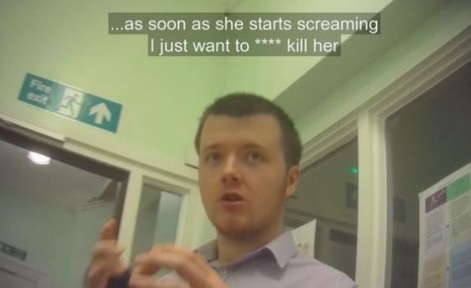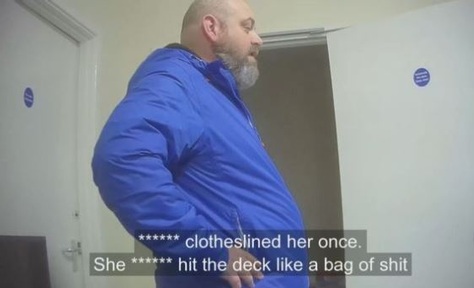Government slams 'appalling' abuse at secure hospital exposed by Panorama
Care minister Caroline Dinenage has said she is "deeply sorry" for the abuse by care workers towards people with autism and learning disabilities at Whorlton Hall.
The disturbing undercover footage taken by Panorama, showed how vulnerable patients at the secure hospital were continually taunted, restrained and treated with violence.
In the wake of the exposé, 16 care workers have been suspended and police have launched an investigation.
Ms Dinenage condemned the abuse and told the House of Commons: "On behalf of the health and care system, I am deeply sorry that this has happened.
"One thing we can all be clear on is that what was shown last night was not care, nor was it in any way caring. We know the problems that exist in this system and we are utterly determined to address them."

On the programme ‘Undercover hospital abuse scandal’, BBC reporter, Olivia Davies, worked undercover as a care worker for two months between December and February.
One of the most upsetting scenes in the programme shows two male staff laughing about psychologically torturing a young female patient.
She has a fear of men, and they threaten her with pressing ‘a man button’ in her room to fill it with men. They knew this caused her considerable distress.
In another scene, a care worker is seen referring to the secure hospital in County Durham as ‘a house of mongs’.
‘I don’t want to leave her with anyone else ever again'
While in another clip, one patient is told by her care worker her family are "poison".
Physical restraint in the film is also shown to be excessive and often, violent.
One mother of a patient being restrained in the footage tearfully said: “I don’t want to leave her with anyone else ever again.” She paused before saying, “I just want to look after her myself.”
Whorlton Hall, a 17-bed hospital, has now been closed. It is owned by Cygnet Healthcare, which acquired the Danshell Group last year. Cygnet has said it is ‘cooperating fully’ with the investigation.

MP Norman Lamb called the footage "deeply shocking", and called for an investigation into the responsibilities of the care provider. He also criticised the practice of housing vulnerable adults in residential units outside their communities and asked: "Will there be substantial investment now in developing community facilities so that people with learning disability and autism have the chance of a good life that the rest of us take for granted."
CQC alerted to abuse by whistle-blowers
Dr Paul Lelliott, deputy chief Inspector of hospitals (lead for mental health), at the CQC called it "sickening abuse of vulnerable people" and said: "As soon as the BBC told us that they had evidence of abuse we alerted the police and they are now investigating.
"Working with the local authority and NHS England we have acted urgently to protect the people living at Whorlton Hall. Sixteen members of permanent staff were immediately suspended and CQC inspectors, NHSE England, a safeguarding team from the local authority and clinical staff from the local NHS mental health trust have all been onsite to ensure that people are safe.”
The CQC has carried out unannounced inspections at a number of services for people with a learning disability and/or autism operated by Cygnet and are also undertaking a review of all locations operated by the provider to "explore whether there are any areas of concern".

Questions are likely to be asked about why the provision was given a ‘good’ by the CQC in September 2017; if the service has deteriorated since then; and whether the care watchdog failed to detect any neglect that may have been occurring at that time.
Whistleblowers did contact the CQC in March 2018, with the CQC revealing its inspection of the hospital in March 2018, was triggered by whistleblowing concerns.
"Our inspectors identified concerns around staffing; staff sometimes worked 24-hour shifts, agency staff were not receiving appropriate training, and not all staff were receiving individual supervision. We found the provider in breach of regulations and told them to address these issues," stated the watchdog.
The Voluntary Organisations Disability Group (VODG) wants to see radical change.
A spokesperson for VODG said: "A failure in the ‘market’ where these services operate means that secure hospitals are keeping people locked up for years. Some are places where abuse is too easy. These environments cannot offer an ordinary life to people who need support to live their lives. The ongoing commissioning of secure inpatient provision is a national scandal that must be brought to a halt."
There have been several recent scandals surrounding the care of vulnerable people with learning disabilities in secure hospitals. Many patients in these settings are likely to be detained under the Mental Health Act and so are especially vulnerable.
In 2013, eighteen-year-old Connor Sparrowhawk, who had learning disabilities and epilepsy, died at an NHS unit in Oxford; when he had a seizure alone in a bath at the unit.
There was also the Winterbourne scandal eight years ago where systematic abuse of disabled and autistic patients led to the home being closed down.
Professor Martin Green, chief executive of Care England, made reference to Winterbourne View, saying: “The findings of this undercover programme are utterly shocking. The behaviour of the staff is utterly deplorable and frankly totally inexplicable.
“It is unacceptable that eight years after Winterbourne View abuse has not been stamped out. Care England wants to work with the health and care system to see more people cared for in local communities."
Latest News
 29-Jul-24
Dementia Bus gives carehome.co.uk staff insight into life with dementia
29-Jul-24
Dementia Bus gives carehome.co.uk staff insight into life with dementia
 01-Mar-24
Find out the top care homes in 2024
01-Mar-24
Find out the top care homes in 2024
 21-Mar-23
UK's top care homes in 2023 revealed
21-Mar-23
UK's top care homes in 2023 revealed
 03-Jan-23
carehome.co.uk launches free care helpline
03-Jan-23
carehome.co.uk launches free care helpline
 13-Dec-22
5 mins with Emily Whitehurst, chief operating officer for Constantia Healthcare
13-Dec-22
5 mins with Emily Whitehurst, chief operating officer for Constantia Healthcare